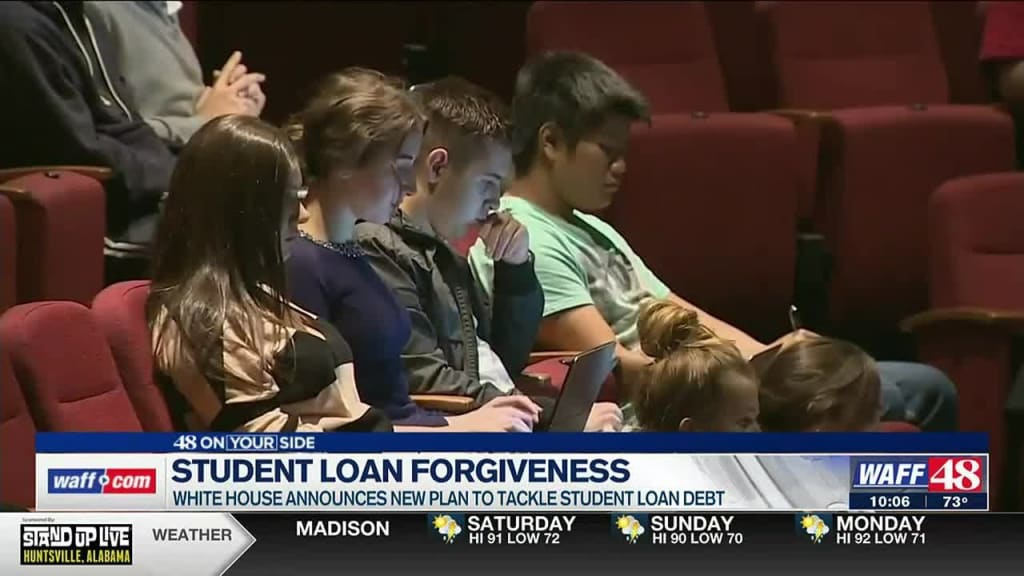Content warning
This story may contain sensitive material or discuss topics that some readers may find distressing. Reader discretion is advised. The views and opinions expressed in this story are those of the author and do not necessarily reflect the official policy or position of Vocal.
Student Loan Forgiveness:
Exploring the Debate, Programs, and Impact

Introduction:
Student loan forgiveness has become a prominent topic of discussion and debate, particularly in countries like the United States where student debt has reached staggering levels. Advocates argue that forgiveness can alleviate the burden on borrowers and stimulate economic growth, while critics express concerns about fairness, moral hazard, and fiscal responsibility. In this article, we delve into the complex issue of student loan forgiveness, exploring its history, various forgiveness programs, and the potential impact it may have on individuals and the economy.
Part 1: The Student Loan Crisis
The student loan crisis refers to the growing problem of escalating student debt. As the cost of higher education has increased, more students and graduates find themselves burdened with substantial loan obligations. This crisis has far-reaching implications for individuals, families, and the broader economy, affecting everything from personal finances to career choices and household spending.
Part 2: Understanding Student Loan Forgiveness
Student loan forgiveness is a policy or program that allows borrowers to have a portion or all of their student loans forgiven or canceled under certain conditions. It aims to provide relief to borrowers who may be struggling to repay their loans or who have pursued careers in public service or underserved areas. Forgiveness programs can take various forms, including income-driven repayment plans, public service loan forgiveness, and targeted forgiveness for specific professions or sectors.
Part 3: Arguments in Favor of Student Loan Forgiveness
Advocates of student loan forgiveness argue that it can have numerous benefits. It can alleviate the financial burden on borrowers, providing them with more disposable income and the ability to invest in other areas such as homeownership, entrepreneurship, or retirement savings. Forgiveness programs can also stimulate economic growth by freeing up funds that would have otherwise gone toward loan repayment and encouraging consumer spending and investment.
Part 4: Concerns and Criticisms
Critics of student loan forgiveness raise several concerns. One common argument is that forgiving student loans may create moral hazard, as it could incentivize future students to borrow irresponsibly, leading to increased tuition costs and a perpetuation of the cycle. Others argue that forgiveness may be unfair to those who have already paid off their loans or who made different financial choices. Fiscal responsibility is another concern, as the cost of widespread loan forgiveness programs could impose a significant burden on taxpayers or the government.
Part 5: Existing Student Loan Forgiveness Programs
Several student loan forgiveness programs already exist, providing relief to specific groups of borrowers. Public Service Loan Forgiveness (PSLF) offers loan forgiveness to individuals who work in qualifying public service jobs and make a certain number of on-time payments. Income-driven repayment plans, such as Pay As You Earn (PAYE) and Revised Pay As You Earn (REPAYE), offer loan forgiveness after a specific period of repayment, usually 20 or 25 years.
Part 6: Policy Proposals and Debates
The issue of student loan forgiveness has sparked intense debate among policymakers and politicians. Various proposals have been put forward, ranging from targeted forgiveness for low-income borrowers to more sweeping plans for universal debt cancellation. The discussions involve considerations of affordability, equity, and the potential impact on the economy and financial markets.
Part 7: Potential Impact on Borrowers and the Economy
The impact of student loan forgiveness on individual borrowers and the economy as a whole is a complex issue. While forgiveness can provide immediate relief to borrowers, it may also have unintended consequences. It could result in a shift in market dynamics, affecting the availability and cost of future student loans. The economic impact depends on the scale and design of the forgiveness programs, as well as the broader context of other fiscal and economic policies.
Part 8: Considering Alternative Solutions
In addition to student loan forgiveness, there are alternative solutions that aim to address the student debt crisis. These include reforms to the student loan system, such as simplifying loan repayment options, increasing transparency in tuition pricing, and expanding access to grants and scholarships. Improving financial literacy and promoting affordable education options are also crucial components of a comprehensive approach to tackling the issue.
Conclusion:
Student loan forgiveness is a complex and contentious topic that involves considerations of fairness, affordability, and economic impact. While advocates argue that forgiveness can provide relief to struggling borrowers and stimulate economic growth, critics express concerns about moral hazard and fiscal responsibility. As policymakers and society grapple with this issue, finding a balance between addressing the student loan crisis and ensuring long-term financial sustainability is paramount. It requires thoughtful analysis, careful planning, and a comprehensive approach that considers the needs of borrowers, the impact on the economy, and the pursuit of affordable and accessible higher education.
About the Creator
Enjoyed the story? Support the Creator.
Subscribe for free to receive all their stories in your feed. You could also pledge your support or give them a one-off tip, letting them know you appreciate their work.





Comments
There are no comments for this story
Be the first to respond and start the conversation.